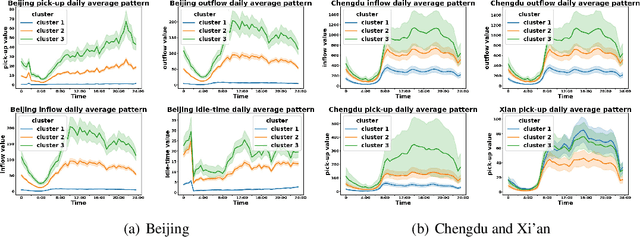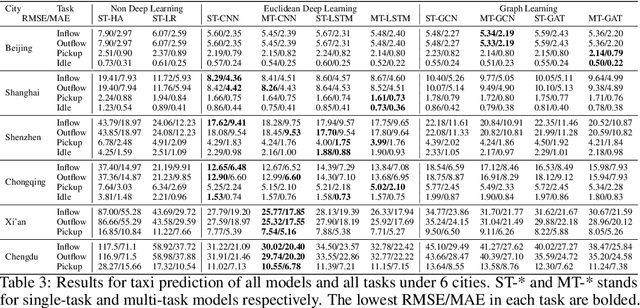Zhengfei Zheng
CityNet: A Multi-city Multi-modal Dataset for Smart City Applications
Jun 30, 2021



Abstract:Data-driven approaches have been applied to many problems in urban computing. However, in the research community, such approaches are commonly studied under data from limited sources, and are thus unable to characterize the complexity of urban data coming from multiple entities and the correlations among them. Consequently, an inclusive and multifaceted dataset is necessary to facilitate more extensive studies on urban computing. In this paper, we present CityNet, a multi-modal urban dataset containing data from 7 cities, each of which coming from 3 data sources. We first present the generation process of CityNet as well as its basic properties. In addition, to facilitate the use of CityNet, we carry out extensive machine learning experiments, including spatio-temporal predictions, transfer learning, and reinforcement learning. The experimental results not only provide benchmarks for a wide range of tasks and methods, but also uncover internal correlations among cities and tasks within CityNet that, with adequate leverage, can improve performances on various tasks. With the benchmarking results and the correlations uncovered, we believe that CityNet can contribute to the field of urban computing by supporting research on many advanced topics.
Predicting origin-destination ride-sourcing demand with a spatio-temporal encoder-decoder residual multi-graph convolutional network
Oct 17, 2019



Abstract:With the rapid development of mobile-internet technologies, on-demand ride-sourcing services have become increasingly popular and largely reshaped the way people travel. Demand prediction is one of the most fundamental components in supply-demand management systems of ride-sourcing platforms. With accurate short-term prediction for origin-destination (OD) demand, the platforms make precise and timely decisions on real-time matching, idle vehicle reallocations and ride-sharing vehicle routing, etc. Compared to zone-based demand prediction that has been examined by many previous studies, OD-based demand prediction is more challenging. This is mainly due to the complicated spatial and temporal dependencies among demand of different OD pairs. To overcome this challenge, we propose the Spatio-Temporal Encoder-Decoder Residual Multi-Graph Convolutional network (ST-ED-RMGC), a novel deep learning model for predicting ride-sourcing demand of various OD pairs. Firstly, the model constructs OD graphs, which utilize adjacent matrices to characterize the non-Euclidean pair-wise geographical and semantic correlations among different OD pairs. Secondly, based on the constructed graphs, a residual multi-graph convolutional (RMGC) network is designed to encode the contextual-aware spatial dependencies, and a long-short term memory (LSTM) network is used to encode the temporal dependencies, into a dense vector space. Finally, we reuse the RMGC networks to decode the compressed vector back to OD graphs and predict the future OD demand. Through extensive experiments on the for-hire-vehicles datasets in Manhattan, New York City, we show that our proposed deep learning framework outperforms the state-of-arts by a significant margin.
 Add to Chrome
Add to Chrome Add to Firefox
Add to Firefox Add to Edge
Add to Edge